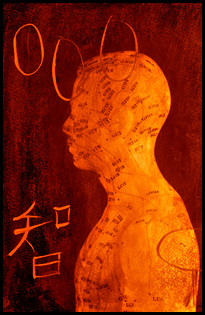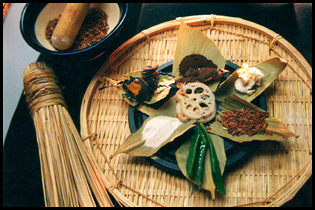
Acupuncture
What is it & how does it work?
This question has been under debate for many years. Without breaking it down into a scientific box, here are my thoughts on Acupuncture:
I have observed many different approaches to acupuncture from the art to the method, to the procedure. It all leads me back to understanding the root or basic foundation that became classical teachings. For me, classical acupuncture teachings will continue to stand the test of time. Classical teachings are a gift in my life and I am honored to share them with others.
Acupuncture was never intended as a sole system for pain management, nor intended to treat or cure any modern disease or symptomology. It is better understood as a compliment to the whole, to help support other modalities in preventative care.
In its purist nature, acupuncture is an innate part of man’s wisdom – an art form that adopts its teaching, helping to simplify the complexities of our existence. Acupuncture is nothing more than the art of living. Acupuncture is an extension of our well-being. Through a sense of stillness, creating balance, renewal, giving way to our true self, aware and awake, we then are able to be more present to live fully.
For a moment, I would like to invite each of you to take a close look at your environment. Living nature is all around us. This is how I was taught, how everything is interrelated. All relationships in life whether it is man, animal, plant, mineral, or cell must have a few things to survive and thrive. Without energy and communication, relationships do not last. With proper communication we gain balance and potential growth: mentally, emotionally, physically, and spiritually.
— Cheltón Kleitz
Questions & Answers
About Chinese Herbal Medicine
Herbal medicine is the main modality or treatment within Traditional Chinese Medicine or TCM. TCM is the world’s oldest, continually practiced professional medicine. Its written history stretches back not less than 2,500 years and its practice is undoubtedly much older than that. Although acupuncture was the first Chinese modality to gain wide acceptance in the West, Chinese herbal medicine is quickly establishing itself as one of the most popular and effective alternative therapies in the West.
Q: What’s the difference between Western folk herbalism and Chinese herbal medicine?
A: Western folk herbalism primarily treats diseases or symptoms, such as headaches, runny nose, menstrual pain, etc. Chinese herbal medicine, when practiced as part of TCM, is based on an individualized pattern diagnosis as well as a disorder diagnosis. This means the TCM patient receives a custom written herbal prescription designed to assist both the discomfort or disease and also their individual pattern. Such a TCM pattern is made up of a person’s signs and symptoms as well as their emotional temperament and bodily constitution.
Q: Are there any other differences?
A: Western folk herbalism primarily uses single herbs or groups of herbs which treat the same symptom or disease. TCM formulas include from 6-18 herbs. They are carefully crafted to include herbs addressing a person’s main symptoms as well as their entire pattern.
Q: Are the “herbs” vegetable in origin?
A: Although called Chinese herbal medicine, TCM practitioners use ingredients from all three kingdoms, vegetable, animal, and mineral. However, the majority of these are from vegetable sources. Leaves, flowers, twigs, stems, roots, tubers, rhizomes, and barks are some of the vegetable parts used.
Q: Do all the herbs come from China?
A: From 15-20% of the standard Chinese repertoire of 500 ingredients originated from outside China. The Chinese have adopted and incorporated into their materia medica herbs from all over the world. What makes these “Chinese” herbs is that they are prescribed according to Chinese medical theory and a TCM pattern diagnosis.
Q: Do Chinese herbs work for Western Patients?
A: Yes, empirical evidence has proven that Chinese herbal medicine works for Westerners just as well as for Chinese. Chinese herbal medicine has been used successfully in North and South America, Europe, Africa, Australia, New Zealand, and all throughout Asia.
Q: How are Chinese herbs taken?
A: The most common method of taking Chinese herbal medicine is as a decoction. This means that the herbs are cooked at a low boil for an hour or more and then strained and drunk 2-3 times per day. However, there are also herbal pills, tinctures, and powdered extracts for those who do not have the time or taste for drinking traditional decoctions.
Q: What are the benefits of drinking Chinese herbs in decoction?
A: This method allows the practitioner maximum flexibility in writing a prescription. They can put in just what is necessary in just the right amounts. The formula can be changed even on a daily basis if necessary and decoctions tend to be more potent then other means of administration.
Q: Why do herbal decoctions taste so bad?
A: Chinese herbal teas tend to taste very bitter because they are made mostly from roots and barks where the strongest medicinal ingredients are found. If the formula is correctly written, the bad taste should go away after 1-2 days. After that time, the patient may even come to crave the taste. This shows that the medicine is working.
Q: What are the benefits of pills and powders?
A: Pills and powders are good for prolonged administration in the case of chronic disease where formulas do not have to be very potent or changed on a frequent basis. Pills and powders are also commonly used to consolidate therapeutic results after a successful course of therapy with decoctions.
Q: Does Chinese herbal medicine have side effects?
A: No, not if the formula has been correctly chosen and written. Most of the medicinals in the Chinese materia medica have a very low toxicity compared to even common, over the counter Western drugs. When they are prescribed according to a correct TCM pattern diagnosis, they should have virtually no side effects, only beneficial healing results. If a patient experiences any discomfort while taking Chinese herbs, they should tell their practitioner, who will then modify their formula until there are no side effects.
Q: What is Chinese herbal medicine good for?
A: Chinese herbal medicine treats the full range of human disorders. It addresses acute disorders like intestinal flu and the common cold, as well as chronic disorders, such as allergies, gynecological disorders, autoimmune diseases, chronic viral symptoms, and degenerative disorders due to aging. In particular, Chinese herbal medicine is especially good for promoting the body’s ability to heal and recuperate.
Q: Can pregnant women take Chinese herbs?
A: Yes, if prescribed by a professional TCM practitioner. Chinese herbal medicine has been used for over 2,000 years to treat more than two score of diseases and symptoms occurring during pregnancy without harm to the fetus. Likewise, lactating mothers can take Chinese herbal medicine safely as long as they are prescribed by a trained practitioner.
Q: Can children take Chinese herbal medicine?
A: Yes again. Pediatrics is a specialty within TCM and children can be given reduced dosages. There are also special prepared pediatric medicines in pill and powder form. Chinese herbal medicine can treat colic, the fussiness of teething, earache, diarrhea, cough, and fever in babies and children.
Q: How long does it take to see results with Chinese herbal medicine?
A: In acute conditions, results can be expected in a matter of minutes. In chronic conditions, some results should be seen within two weeks. Although chronic conditions may require taking Chinese herbal medicine for a long time, nonetheless, signs that the medicine is working should be apparent to patient and practitioner alike almost from the very start.
Q: How do I know if a practitioner is professionally trained in Chinese herbal medicine?
A: In some state, such as California, all acupuncturists must pass a licensing test which includes Chinese herbal medicine. In addition, the National Commission for the Certification of Acupuncturists (NCCA) has created a certification process for Chinese herbal medicine. Practitioners who have passed that certification process are entitled to add the abbreviation Dipl. C.H. for Diplomat of Chinese Herbs after their name. Although Chinese herbs are safe when professionally prescribed by a trained, knowledgeable practitioner, they are strong medicine nevertheless. Therefore, it is important that a practitioner be adequately schooled and experienced in their use. A prospective patient should feel free to ask about the training and credentials of a potential practitioner.
For an appointment or information on our herbs and other products, please give us a call.

Cheltón Kleitz
L.c. ACP. Dip.O.M.
info@jadebamboo.com
913.671.7668

